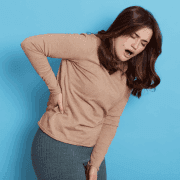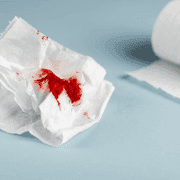What Are the Symptoms of Piles in Women?
In This Article
What Are the Symptoms of Piles in Women?
Prathibha
Updated on January 17, 2025
Medically verified by Dr. Arya
Fact checked by Dr. Fazeela

Proctology
4 min read
Piles, also known as hemorrhoids, are swollen veins in the rectal or anal area that can cause discomfort and pain. Women, especially during certain stages of life like pregnancy or menopause, are particularly susceptible to developing piles. Understanding the signs of piles in women can help in early detection and effective treatment. In this blog, Mykare Health covers the symptoms, underlying causes, and the most advanced treatment options available for piles in women, highlighting modern facilities and innovative medical approaches.
Signs of Piles in Women
Piles can present with various symptoms, depending on their severity and type (internal or external). Here are the common signs of piles in women
1. Pain or Discomfort: Women may experience pain or discomfort in the rectal area, especially while sitting or during bowel movements.
2. Itching or Irritation: Persistent itching or irritation around the anus is a common sign of hemorrhoids.
3. Swelling or Lumps: Swollen areas or small lumps near the anus are typical signs of external piles. These lumps can sometimes be tender to touch.
4. Bleeding: Bright red blood on toilet paper or in the stool is a classic symptom of piles. This is usually painless and occurs during bowel movements.
5. Mucus Discharge: A slimy mucus discharge after passing stool may indicate internal piles.
6. Incomplete Bowel Movements: Women with piles may feel that their bowel movements are incomplete or experience frequent urges to use the restroom.
7. Prolapse: In severe cases, internal hemorrhoids issues for women may protrude outside the anal opening, causing discomfort and pain.
 5 min read
5 min readDon't Ignore Bummy Pain: Could It Be Piles?
 7 min read
7 min readBlood In The Stool: A Sign You Shouldn’t Ignore
 6 min read
6 min readSitting All Day Wreaking Havoc? It Might Be Piles!
Get a Callback Now
Why Are Women Prone to Piles?
Women are at a higher risk of developing piles due to
-
Pregnancy: Increased pressure on the pelvic veins during pregnancy often leads to the development of piles.
-
Hormonal Changes: Hormonal fluctuations during menopause or menstruation can affect bowel habits, increasing the risk of hemorrhoids issues for women.
-
Chronic Constipation: Constipation, often linked to dietary habits or stress, is a major cause of piles in women.
-
Straining During Bowel Movements: Repeated straining puts pressure on rectal veins, leading to piles.
Piles Treatment for Women
Fortunately, piles can be treated effectively with various options, ranging from lifestyle changes to medical interventions
Lifestyle Modifications:
- Eat a fiber-rich diet to prevent constipation.
- Drink plenty of water to keep stools soft.
- Avoid prolonged sitting or straining during bowel movements.
Topical Treatments:
Over-the-counter creams or ointments can provide temporary relief from pain and itching.
Medications:
- Laxatives may be prescribed to ease constipation.
- Pain relievers can help manage discomfort.
Minimally Invasive Procedures:
Rubber band ligation and sclerotherapy are common treatments for internal hemorrhoids.
Surgical Options:
In severe cases, procedures like hemorrhoidectomy or stapled hemorrhoidopexy may be necessary.
FAQ
1. How to treat piles in women?
Piles in women can be treated through various methods, including lifestyle changes, over-the-counter creams, medications, minimally invasive procedures, and, in severe cases, surgical options. Key lifestyle changes include eating a high-fiber diet, staying hydrated, and avoiding prolonged sitting. Medical interventions like rubber band ligation or hemorrhoidectomy may be necessary for advanced cases.
2. Do piles cause bleeding in females?
Yes, piles can cause bleeding in females. Bright red blood during or after bowel movements is a common symptom, often seen with internal hemorrhoids issues for women. If bleeding persists or is severe, consulting a healthcare professional is important for proper evaluation and piles treatment.
3. How to treat piles in women?
Piles can be treated with lifestyle changes, topical piles treatments, medications, or procedures like rubber band ligation and hemorrhoidectomy, depending on severity.
4. Do piles cause bleeding in females?
Yes, piles can cause bright red bleeding, especially during bowel movements, which is a common symptom of hemorrhoids.
5. What foods help prevent piles in women?
A diet rich in fiber, such as fruits, vegetables, whole grains, and legumes, can help prevent constipation and reduce the risk of piles.
6. Can pregnancy cause piles in women?
Yes, the increased pressure on pelvic veins during pregnancy often leads to the development of piles.
7. Are there non-surgical treatments for piles?
Yes, non-surgical treatments like rubber band ligation, sclerotherapy, and dietary changes can effectively manage piles in many cases.
8. Can piles heal on their own?
Mild piles may resolve with lifestyle changes and home care, but persistent or severe cases require medical intervention.
9. Is itching a common symptom of piles?
Yes, persistent itching around the anus is a typical symptom of hemorrhoids.
10. When should I consult a doctor for piles?
Consult a doctor if symptoms like bleeding, severe pain, or prolapse occur or if over-the-counter treatments fail to provide relief.
11. Are piles contagious?
No, piles are not contagious. They result from swollen veins and are unrelated to infections.
Recognizing the signs of piles in women early can help in managing the condition effectively.
Common symptoms include pain, itching, bleeding, and swelling around the anus.
Women are more prone to piles due to factors like pregnancy, hormonal changes, and chronic constipation.
Treatment options range from lifestyle modifications to advanced medical procedures.
Consult a healthcare professional for an accurate diagnosis and personalized treatment plan.
Source Links
Mayo Clinic: Hemorrhoids - Symptoms and Causes
American Society of Colon and Rectal Surgeons (NORD)
PubMed NCBI Gastroenterology: Hemorrhoids Overview



